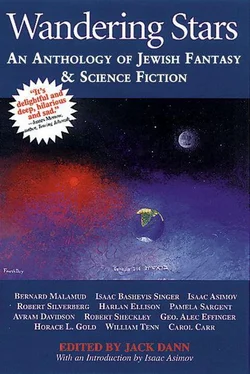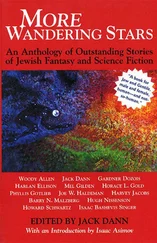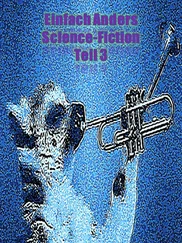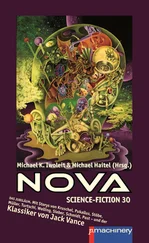And that’s the third point. Why I, Milchik the TV man, am telling you this, and why you come all the way from Earth just to listen to me. Because I’m not only a Jewish father, but I’m also—Listen. Could I ask you a question? You won’t be offended? You sure you won’t be offended?
You’re not Jewish, by any chance? I mean, do you have any Jewish ancestors, a grandfather, a great-grandmother maybe? Are you sure? Well, that’s what I mean. Maybe one of your ancestors changed his name back in 2533—2533 by your calendar, of course. It’s not exactly that you look Jewish or anything like that, it’s just that you’re such an intelligent man and you ask such intelligent questions. I couldn’t help wondering—
You like Jewish food? In twenty, twenty-five minutes my poor old tired module will pull us out of this orange dust and into the Darjeeling air lock. Then you’ll sit down to a Jewish meal, believe me, you’ll kiss every one of your fingers. We get almost all of our Jewish food shipped here from Earth, special packaging and special arrangement. And, naturally, special cost. My wife Sylvia makes a dish, they come from all over our level just to taste: chopped reconstituted herring. It’s an appetizer and we like appetizers in our family. So what I’ve been telling you, after all, is only an appetizer. I have to get you in exactly the right mood for the main dish, the big story you came for.
Sylvia makes all the food we eat in the shul —our synagogue. You know, the hamantashen, all that. She even prepares the formal Saturday morning breakfast, the bagels and lox and cream cheese that all the men must eat before they say their Sabbath prayers. We’re all orthodox here and we practice the Levittown rite. Our rabbi, Joseph Smallman, is superorthodox Levittown: he wears a yarmulka, and on top of the yarmulka a black homburg which has been passed down from father to son in his family for I don’t know how many centuries.
Oh, look how you’re smiling! You know I’ve moved from the appetizer to the main dish. Rabbi Joseph Smallman. It’s only Venus, and it’s maybe the seventh or eighth Darjeeling burrow listed on the map, but have we got ourselves a rabbi! To us he’s an Akiba, a Rambam.
More than that. You know what we call him when we’re alone, among ourselves? We call him the Great Rabbi of Venus.
Now you’re laughing out loud. No, don’t apologize: I heard a chuckle come out of you, like a belch, you should excuse the expression, after a big dinner.
This Milchik the TV man, you’re saying to yourself, he and his neighbors in the burrow they come to maybe seventy or eighty Jewish families, they’re making a living, with God’s help, out of the holes in each other’s pockets—and their rabbi is the Great Rabbi of Venus? The littlest hole in the ground claims the biggest fire?
It’s impossible, maybe? Is anything impossible to the Most High, blessed be His Name? After all, as the Sages tell us, “The last shall be first.” Just don’t ask me, please, which Sages.
Why is he the Great Rabbi? Well, first of all, why shouldn’t Rabbi Smallman be a Great Rabbi? He needs a certificate from the Great Rabbi Licensing Bureau? You have to graduate from the Great Rabbi Special Yeshiva to become a Great Rabbi? That’s first of all: you’re a Great Rabbi because you act like a Great Rabbi, you’re recognized like a Great Rabbi, you make decisions like a Great Rabbi. And you must have heard something of how he acted and how he decided when all the Jews in the universe held a congress right here on Venus. If you hadn’t heard, you wouldn’t have come all the way from Earth for this interview.
Other people had heard, too. They’d heard of his piety, learning, and wisdom—of his modesty, of course, I say nothing—long before the First Interstellar Neozionist Conference on Venus. People heard and people talked, and they came from as far away as the Gus Grissom Burrow to ask him for rabbinical decisions.
You’ve got the time to listen to just one example? Sure you’ve got the time: you’re driving through a heavy dust storm in a module that’s coughing its guts out, a module that knows Milchik the TV man gives it the best of everything—charged-up power cells, a brand-new fan belt—even if it means that he can’t afford to put food on his own table. For Milchik, the module will keep going no matter what, when by itself it would ask for nothing better than to lie down and die in comfort. And the module also likes to listen to Milchik expounding Halacha , the holy rules and laws.
About five years ago, something terrible happened on the eve of the Passover. There was an explosion aboard a cargo ship on its way to Venus. No one was hurt, but the cargo was damaged and the ship arrived very late, just a couple of hours before the first seder was to begin. Now on this ship was all the special Passover food that had been ordered from Earth by the twenty-four Jewish families of the Altoona Burrow, and the special food was in cans and airtight packages. When the delivery was made, the Altoona people noticed that the cans had been banged about and dented—but, worse than that, most of the cans had tiny holes all over them. Disaster! According to the Rabbinical Council of 2135 on Space Travel Kashruth, food which is in a punctured can is automatically unclean, unclean for daily use, unclean for Passover use. And here it is almost the seder and what can they do?
These are not rich people: they don’t have reserves, they don’t have alternatives, they don’t even have their own rabbi. If it’s a matter of life and death, all right, anything goes; but it isn’t life and death, all it means is that they’ll have to eat humetz , non-Passover food, they won’t be able to celebrate the seder. And a Jew who can’t celebrate the Deliverance from Egypt with matzo, with bitter herb, with charoseth, with Passover wine, such a Jew is like a bride without a wedding canopy, like a synagogue without a Torah scroll.
The Altoona Burrow is connected to the Darjeeling Burrow; it’s a suburb of ours. That’s what I said—a suburb. Listen, I know we’re a small place, but where is it written that small places, no matter how small, are not entitled to suburbs? If Grissom can have fourteen suburbs, we can have two. So naturally the Altoona people, white-faced, worried, their mouths opening and closing with aggravation, brought the problem to our Rabbi Joseph Smallman. Nothing was leaking from the cans, they said, but the result of the one test they had conducted was bad: as recommended by the Rabbinical Council of 2135, they had taken a hair from somebody’s head and poked it into a hole in a can—and the hair had not visibly curled back out. Did that mean that all the expensive food shipped across space had to be condemned, no seders in the Altoona Burrow?
Well, of course that’s what it meant—or would have meant to an ordinary rabbi. Rabbi Smallman looked at them and looked at them, and he scratched the pimple on the right side of his nose. He’s a pretty good-looking man, Rabbi Smallman, strong and chunky with a face like a young Ben-Gurion, but he does always seem to have a big red pimple on the side of his nose. Then he got up and went to his bookcase and took out half a dozen volumes of Talmud and the last three volumes of the Proceedings of the Rabbinical Council on Space Travel. And he looked in each book at least once, and he sat and thought for a long time after each passage. Finally he asked a question: “Which hair did you use and from whose head?”
They showed him the hair, a fine, white hair from the head of the oldest great-grandfather in the Altoona Burrow, a hair as thin and as delicate as a baby’s first sigh. “So this hair did not curl back,” he said, “from a hole in that particular can. So much for your test with a hair of your selection. Now for my test with a hair of my selection.” And he called over my oldest boy, Aaron David, and told him to pluck out a hair.
Читать дальше












